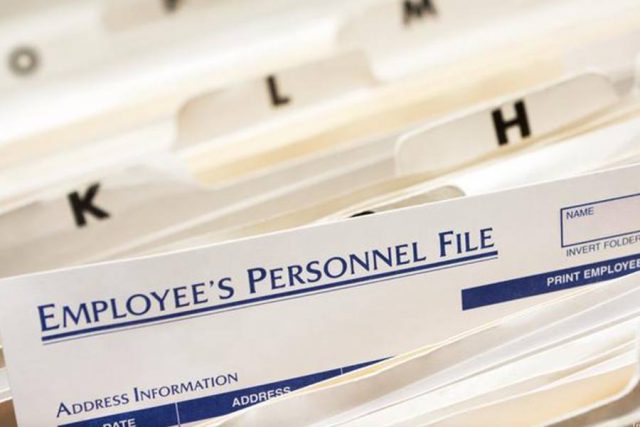According to Turkish law, there are some documents that employers are obliged to keep in accordance with Turkish labour and social security law. In addition to showing these documents as evidence in possible disputes, there are also legal obligations to archive and protect them.
In accordance with an obligation arising from Turkish laws, it is obligatory to keep certain documents regarding the employee, at least within the legal retention period as determined by the law. The legal retention periods are as follows:
- In accordance with the Labour Law No. 4857, documents related to employment is subject to a 5-year retention period.
- According to the Social Insurance and General Health Insurance Law No. 5510, documents related employment is subject to a 10-year retention period.
- In accordance with the Occupational Health and Safety Law No. 6331, documents related to employment is subject to a 15-year retention period.

Employee Documents that must be Archived in Terms of the Turkish Labour Law
The Article 75 of the Turkish Labour Code No. 4857 contains the following provision: “The employer prepares a personal file for each employee he/she employs. In this file, the employer is obliged to keep all kinds of documents and records that it has to arrange in accordance with this Law and other laws, as well as the identity information of the worker, and show them to the authorized officers and authorities when requested. The employer is obliged to use the information obtained about the employee in accordance with the rules of honesty and law, and not to disclose the information that the employee has a justified interest in keeping it confidential.”
Therefore, the employer has to organize and keep a personal file for each employee. At the same time, in case of a possible audit or inspection, the relevant inspectors will request to see the originals of the documents. For this reason, it is recommended that the documents in the personnel file be kept as hard copy, with wet signatures and as original document, and submitted in case of inspection of the workplace.
In addition, documents which are showing “workplace rules” and “working conditions” must be kept specifically. It is the most accurate method for employers who have the liability of burden of proof in possible disputes, to protect such documents as wet-signed and as hard copy.
Some documents in the personnel files are documents that must be obtained and archived in the first instance while the employee is employed, while some documents are created or submitted during the employee’s work at the workplace.
Documents showing the wages and other rights that the employees are entitled to be kept for at least the statute of limitations period. In this respect, personal documents should be kept in accordance with the legal statute of limitations as determined by several law branches.
Since the reasonable justification for keeping personal data disappears after the expiry of the statute of limitations, destruction or anonymization of documents containing personal information of workers is mandatory and recommended in accordance with the Personal Data Protection Law No. 6698.
According to the labour legislation, the statute of limitations for receivables is five years. In this framework, it is recommended to keep the documents on wage accruals and payments in the personnel files, with wet signatures and in paper form, during the legal statute of limitations. It is recommended that all documents regarding wage payment be kept for a minimum of 5 years, as they will be used in the calculation of compensation types such as notice pay, severance pay, bad faith compensation, discrimination compensation.
Employee Documents that must be Archived in Terms of the Turkish Social Security Law
According to Social Insurance and General Health Insurance Law No. 5510, employers or business owners are obliged to keep their workplace books, records and documents regarding social security for ten years, starting from the beginning of the year following the relevant year.
It is obligatory to submit these information and documents in full within fifteen days if the Social Security Institution requests submission. Accordingly, the information and documents regarding the social security of the employees must be kept in the personnel file with wet signature and original document for ten years.

General Evaluation
If a general evaluation is to be made, documents regarding employees should be kept for 5 years in accordance with Turkish Tax Law, 10 years in accordance with Turkish Social Security Law, 10 years in accordance with Turkish Commercial Code and 15 years in accordance with Turkish Occupational Health and Safety Law. Here, the retention periods are mandatory, and the personnel files of the employees should be kept until the statute of limitations, starting from the month the documents are produced, and after these periods are expired, they should be destroyed or anonymized in accordance with the Law on the Protection of Personal Data.
Therefore, keeping the documents in the personal files for 15 years will be the most risk-free method.
Documents that are recommended to be included in the personnel file or that are legally required are shared below. It is especially recommended that “Occupational Health and Safety Training Documents”, “Employee debt release documents”, “Documents Regarding Payment of Wages” to be kept with wet signatures.
As a special note, it should be noted that with TÜBİTAK time-stamped electronic signing methods, it is possible to electronically organize and store some employee documents in electronic environment. However, we would like to warn you that it is important to keep the documents pertaining to wages, rights, and obligations in the personnel file with wet signatures and as original documents, and that the contrary may result in negative consequences for the employer in case of possible disputes.
DOCUMENTS REQUIRED TO BE KEPT IN THE EMPLOYEE PERSONNEL FILES
| ACT NO 4857 | ACT NO 5510 | GENERAL DOCUMENTS |
| Employment Contract | Employment Declaration | Criminal Record (If there is such a condition in the special law) |
| Workplace Documents | End-of-employment Declaration | Residence Document |
| Annual Paid Leave Request Document | Monthly Premium and Service Document / Concise and Premium Service Statement | CV Resume – Photo |
| Work Documents | Occupational Health Training Documents | Vocational Education Documents |
| Documents Regarding Annual Leave Board Transactions | Occupational Safety Training Documents | Diploma/ Graduation Certificate |
| Employment Contract Termination Notice | ACT NO 6331 | Document Showing Military Status |
| Wage deduction and payment receipt | Medical Health Reports | |
| Personal Data Protection Protocol | Work Accident Declaration Form | |
| Disciplinary Minutes | Work Accident Minutes | |
| Warning/ Reminder of Duty | Documents Regarding Occupational Disease | |
| Letter of Change in Working Conditions | ACT NO 193 | |
| Wage account slip | Family Status Notification | |
| Employment contract with parents for minors under 18 | Medical Report Indicating Disability | |
| Unpaid Leave Request Petition | Tax Discount Letter | |
| Minutes regarding different issues | ||
| Petitions Regarding Female Employees who have given birth | ACT NO 6735 | |
| Overtime Work Approval | Work Permit for Foreign Employees | |
| Free Time Petition | ||
| Working Certificate | ACT NO 6098 | |
| Work Invitation Letter | Employee debt release document | |
| Documents Regarding Collective Layoff | ||
| Accrual documents regarding compensation and other rights | ACT NO 1774 | |
| Resignation petition | Employee Identification Declaration Form | |
| Excuse Permit Documents | ||
| Photocopy of the ID of the employee | ||
| Documents regarding warnings and defenses | ||

